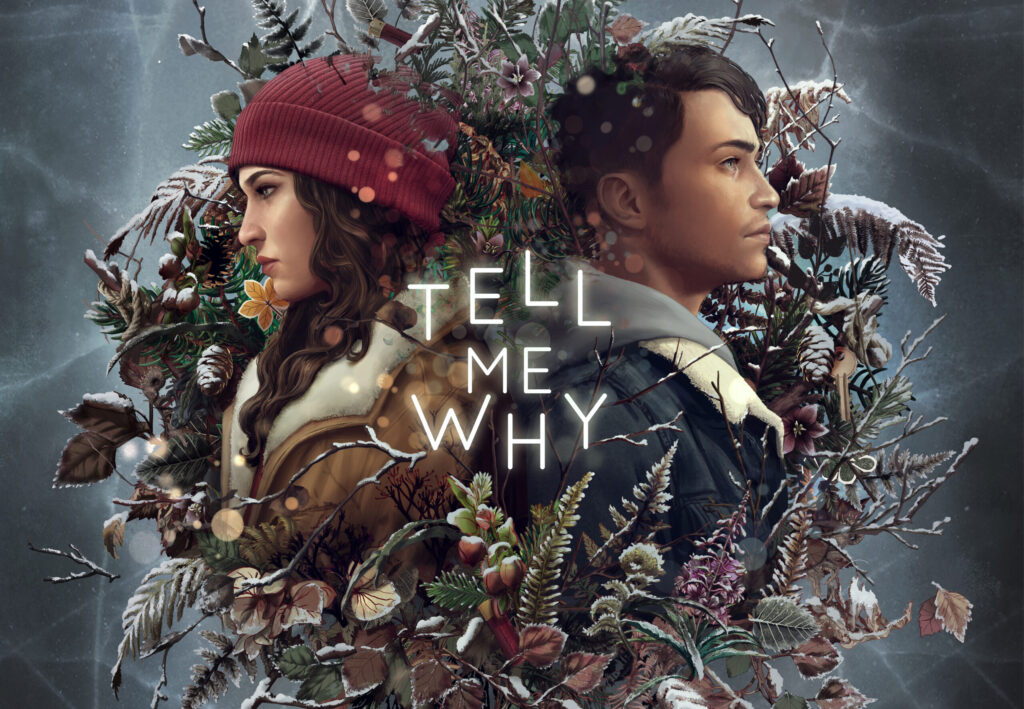
Tell Me Why is the perfect wake-up call to include more queer stories in games
When DONTNOD Entertainment announced that their upcoming mystery, narrative adventure Tell Me Why would feature a queer transman as a main playable character, it would be an understatement to say my socials were blowing up. A lot of people were asking me if I was excited by the news that a major games studio was putting a transgender character front and center of its story. It wasn’t an easy question to answer, because even after reading reassurances from DONTNOD’s dev team that Tyler’s trans identity was only a facet of the story and not the be-all-end-all of Tyler’s experiences, my reservations lingered for reasons beyond DONTNOD and their stated visions for the project.
The reality is, frankly, trans folk have been hurt time and time again by well-intentioned but poorly executed representation in media, and the games industry certainly has a hand in the ways transphobic sentiment circulate unchallenged in our society today. So while I was pleased to hear about the potential of Tell Me Why and was interested to read the studio’s public FAQ addressing concerns about representation within the game, I was still ready to come away feeling a certain degree of ambivalence. Because trans gamers are so starved for representation, I was prepared to weather the areas of inevitable disappointment in the service of finding slivers of good. Given what DONTNOD has produced in the past, I did believe there would be some shimmers of excellence. But ultimately? I was expecting something well-intentioned, but missing the mark at best. Something that would actively contribute to the harm we experience at worst.
Turns out, I’ve never been more pleased to be wrong. Tell Me Why is pretty damn groundbreaking.

Sitting somewhere between the fairy tale fantastical and the hyper-realistic, Tell Me Why is charming, melancholic, uplifting and fraught all at once. It lands in what I’d consider a Slice of Life in the truest sense-a snapshot of small town Americana, showcasing the ways lives touch one another and how those places of contact veer wildly between moments of intense joy and bitter regret.
Set in the picturesque fictional town of Delos Crossing, Alaska, Tell Me Why opens with twins Alyson and Tyler Ronan reuniting after a decade of separation. They are returning to their family home and scene of their mother’s death in preparation to put the house on the market and right away it’s made clear that the twins have a tremendous amount to come to terms with. Not only with their unresolved past traumas, but also how their time apart has seen them to grow into very different people. A huge theme of the narrative is, after all, about realising how little we know about the people around us and there is great value in taking the time to rediscover the people we thought we knew.
Alternating between taking control of Alyson and Tyler, the player guides the twins through the hidden secrets of their home town, uncovering the truth behind the events leading up to their mother’s death through a series of memories that they share with one another via a unique sibling bond.
Your choices as a player throughout the three chapter story significantly impacts the twins’ experiences – both shared and separate – and overlaps with a variety of complex intersecting issues including blood and found family, trauma, sexuality, mental health, indigenous communities, religion, secrets, shame, and courage. In many cases, your choice to preserve one thing means sacrificing another, but rather than skirting away from the complexity of those tense moments, Tell Me Why truly shines by embracing the discomfort of these encounters, highlighting the consequences of choices with precision and care that emphasise emotional conflict and gives equal time and attention to each twin’s individual difficulties, and their unique experiences of their shared tragedy.
There are places where personal grief and rage butt up against indigenous culture and customs, where bonds and trust are tested, and the the player is called on to answer the question of whose feelings matter more in any given moment-Tyler’s or Alyson’s. The answer is never an easy one, as often times we see the twins’ individual interests at odds with one another in highly believable ways made all the more dynamic by the excellent, emotional performances given by Erica Lindbeck as Alyson and August Aiden Black as Tyler. And for better or worse, each player choice has a significant influence on the twins’ relationship in the long term.

Unsurprisingly, one of the things I was most interested to see was what kind of character Tyler would turn out to be. Much to my surprise and pleasure, Tyler is a complicated young man with a sharp wit, passion, and determination. He is both sympathetic and flawed and that, in my opinion, is one of the most valuable things about him as a character.
Throughout my playthrough, while I really wanted the best outcome for him, I also didn’t want to necessarily give him a free pass to rage at everyone around him just because he was also trans and had a rough time. But having the option to have him let people in or shut people out, and each choice be valid and understandable was incredibly valuable and gave him the depth that a character in his position truly deserved, and so rarely gets. Striking this kind of balance takes great care and effort and speaks volumes to the skill of the DONTNOD team, and their dedication to creating not just a trans character, but a character who happens to be trans.
Honestly, I had no idea how much it would mean to see Tyler make mistakes, get angry, be selfish, grow, seek out and deny forgiveness, make connections with others, learn about himself and the world and uncover the truth about himself and his family. He is a deeply damaged and multifaceted character, made all the more interesting by the concern, care, and conflict he experiences with Alyson, who is treated to the same amount of personal attention as Tyler is.
Nothing about Tyler as a transman is treated as gratuitous or heavy-handed. From the moment we take control of him, all the information we need is made available in believable ways that are just part of daily life for transmen. Tyler speaks candidly about binding, about his future plans for his transition as the narrative unfolds, we see dates marked on his calendar about when his next testosterone shots are, and he speaks with confident and without fear about himself as a transman. He is never dead named or misgendered, there are no gotcha! moments seeing Tyler in any state of undress, and there are no ‘tells’ that he is trans. When his transition is discussed, it’s with grace and respect and he is never outed without his permission. Furthermore, any moments of ignorance on the part of other characters is dealt with swiftly and directly, and Tyler is never left to handle these moments alone – he is not expected to teach others about trans identities, and he isn’t the only one to call out moments of transphobia, homophobia, or misogyny.
The other significant thing Tell Me Why offers is the opportunity to explore Tyler’s sexuality and experience genuine warmth and affection from a gay cisman. The work this scene does to normalise the validity of queer transman is immense and cannot be overstated, as it transforms an instance of something that can so easily be an experience of traumatic rejection into something so tender and sweet without being overwrought or overbearing. This is something I honestly never expected to see portrayed in a video game.

Tell Me Why presents players, especially cisplayers who may not know any better, with very clear indicators of how to treat trans people as just that – people. It’s sad to realize just how rare that is to see represented in a game and just how important it is.
Nevertheless, Tell Me Why ensures there is room for ignorant characters to learn and grow, and also that it is sometimes appropriate and valid to say that we don’t owe everyone complete forgiveness if they treat us poorly for being LGBTQ+. Both are extremely important and Tell Me Why balances these aspects incredibly well, making the distinctions for these boundaries clear. It was so cathartic to see that Tyler didn’t need to fight his corner alone and it was done with such grace and without hyperbole. The unambiguously protective energy directed toward the marginalized characters portrayed within Tell Me Why came as such a genuine shock to me too-I really think I’d forgotten how rare it is that marginalized characters are granted basic human decency and complexity on this level. Now I’m desperate for more stories where being emotionally compromised doesn’t come from witnessing a marginalized character being brutalised, just because of who they are.
At its core, Tell Me Why is not a story about a transman. It’s a story about memories and how backward glances at various moments in our lives can not only shape and change us, but can lead us to question the validity of the life narratives we tell ourselves. It’s a story about family and what we do as we carry our memories forward in life. It’s a story that features a transman, but it’s not about him being trans. The game is suspenseful and well-paced with emotionally mature storytelling and believable characters that ultimately lands in an optimistic place no matter what choices are made, something else that is so rarely seen for trans characters in media. This is an exquisite narrative adventure, full of nuance and care with a fantastic cast of incredibly talented voice actors breathing life into the characters living in Delos Crossing.
DONTNOD should be very proud of what Tell Me Why has brought to the table and should act as a wake-up call to the industry, proof that it is entirely possible to tell deep, meaningful stories featuring queer characters and other intersecting marginalised identifies without reducing us to stereotypes and Bad Ends.
Poignant, well-told, and powerful-in the end, Tell Me Why made good on its promise to deliver a story that was not about trans trauma. This game gives me a real sense of hope during a time where it really is quite shit to be trans. It makes me believe that the future of storytelling in video games is bright and diverse, that things will get better. The bar for trans and queer storytelling has well and truly been raised with this game.
Verdict 5/5
Gayming Magazine was provided a code for ‘Tell Me Why’ from Microsoft.






Comments are closed.